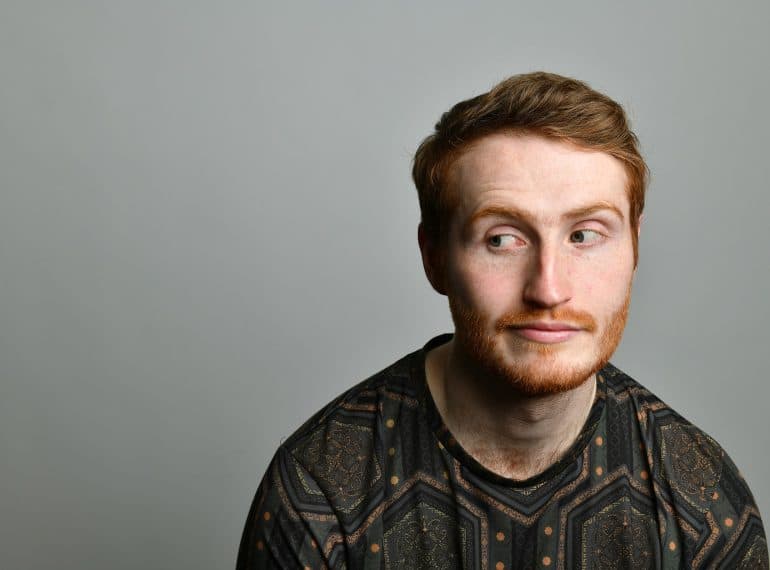
Until recently, Ali Woods was, as one reviewer put it, PR man by day, comedian by night.
Better known to his QE contemporaries as Alister Heywood (OE 2005–2012), he first made a name on TikTok and then gained a big boost when his debut solo show at this year’s Edinburgh Fringe sold out amid five-star reviews.
Now, underpinned by his huge online following, he has given up the day job and become a professional comedian.
The very first time he was involved in performing comedy was at York, where he was reading English & Related Literature. He was part of a university ‘improv’ group called The Shambles. He then first did stand-up in London in 2015 at open mic nights. In 2017, he was runner-up in the Leicester Square New Comedian of the Year competition and was short-listed for a BBC New Comedy Award in both 2017 and 2018.
Alister won Hackney Empire New Act of the Year 2020 – Evening Standard writer Bruce Dessau’s quotation in the headline is from that time. He has appeared on BBC Radio 4, TalkRadio and TalkSport, alongside hosting his own podcast, All I Do Is Fail.
All of this was achieved while he was simultaneously working in PR: he is working his notice as a New Business and Marketing Executive for the Propeller Group (a global PR, content and events agency) and finishes on 21st December.
Alister was planning to do his debut full stand-up show in 2020, but was thwarted by the pandemic. Instead, during lockdown he started making videos, which soon went viral. Today, he has 153,000 followers on Instagram and 113,000 on TikTok. His online comedy sketches under the tag @aliwoodsgigs have gained millions of views and likes, and featured on LadBible and Buzzfeed UK. It is by using this audience that he has now managed to turn professional.
In his comedy, he presents a mix of the ‘everyman’ and the ‘modern man’, displaying sensitivity and a genuine interest in men’s mental health, which gives him a great perspective on the modern ‘lad’ culture. He speaks on topics such as football, the environment, and many social causes close to his heart.
Typically outspoken, he is keen to encourage those interested in creative work to pursue it and get the career they really want: “You can do it, believe that you can. I’ve done it and I’m not even funny!” It was not, he said, an aspiration that was really valued in the QE of his time. “I was never encouraged to take creative work seriously, it was seen as a facilitator for cover letters and CVs.”
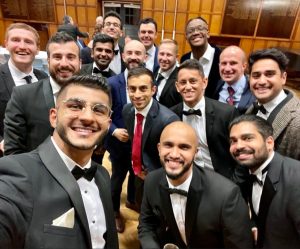 Alister, who was among the guests at this term’s OE Association Dinner, therefore feels a special impetus to encourage today’s pupils if they hold similar interests.
Alister, who was among the guests at this term’s OE Association Dinner, therefore feels a special impetus to encourage today’s pupils if they hold similar interests.
“You can work really hard to end up in a job you hate because you thought it was the safe option,” he says. “I would like to communicate to current QE boys that creative arts are a legitimate pursuit which requires the same work as any difficult degree or discipline or career, and will truly be worth it. If you are passionate about it, and you’re willing to be consistent, put yourself out there, learn from your setbacks and not to give up: it will be the most fulfilling journey you’ll ever make.
“Don’t be afraid to take the risk. Believe that you are able to succeed in a competitive, creative field.”
- You can view Alister’s videos at his website.

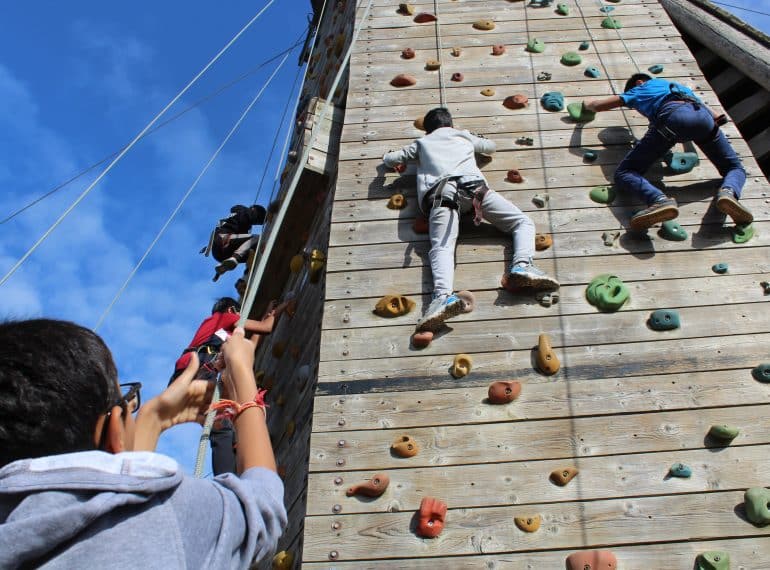
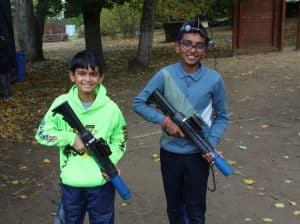 The visit to Stubbers Adventure Centre involved climbing, canoeing, archery and laser tag, with competition aplenty as the boys took on their friends and classmates.
The visit to Stubbers Adventure Centre involved climbing, canoeing, archery and laser tag, with competition aplenty as the boys took on their friends and classmates. The trip was part of the new QE Flourish enrichment programme, which Mr Bonham-Carter oversees.
The trip was part of the new QE Flourish enrichment programme, which Mr Bonham-Carter oversees.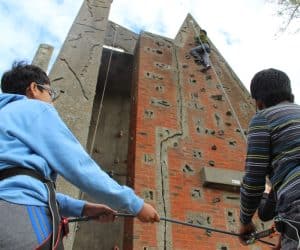 Alongside the healthy competition, some of the activities involved an element of trust. In the wall-climbing, for example, participants had to rely on their team-mates who were on the ground holding their ropes.
Alongside the healthy competition, some of the activities involved an element of trust. In the wall-climbing, for example, participants had to rely on their team-mates who were on the ground holding their ropes.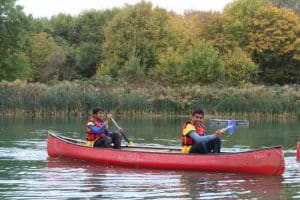 “On the coach journey home, I had my left-over snacks from lunchtime, thinking what fun I had and what memories I made.”
“On the coach journey home, I had my left-over snacks from lunchtime, thinking what fun I had and what memories I made.”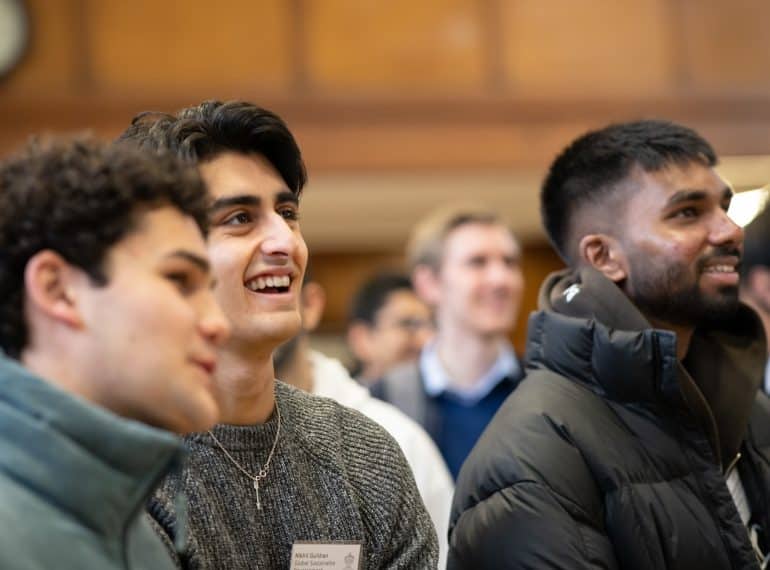
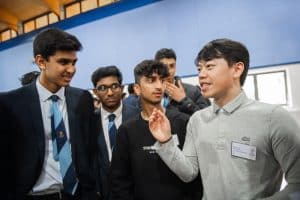 With the 2021 event moved online because of the pandemic, this year’s convention provided an eagerly awaited opportunity for the School’s newest alumni to meet face-to-face with Year 12s thinking about following in their footsteps.
With the 2021 event moved online because of the pandemic, this year’s convention provided an eagerly awaited opportunity for the School’s newest alumni to meet face-to-face with Year 12s thinking about following in their footsteps.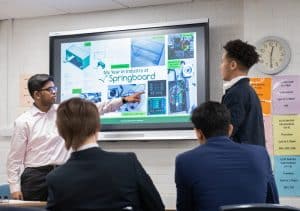 Most of the OEs attending the convention are currently in their first years on sought-after degree courses at leading universities, including Oxbridge and the Russell Group institutions.
Most of the OEs attending the convention are currently in their first years on sought-after degree courses at leading universities, including Oxbridge and the Russell Group institutions.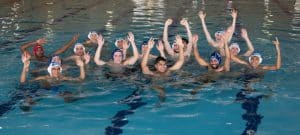 Then, in the afternoon 16 visiting old boys headed for the Martin Swimming Pool for the water polo friendlies.
Then, in the afternoon 16 visiting old boys headed for the Martin Swimming Pool for the water polo friendlies.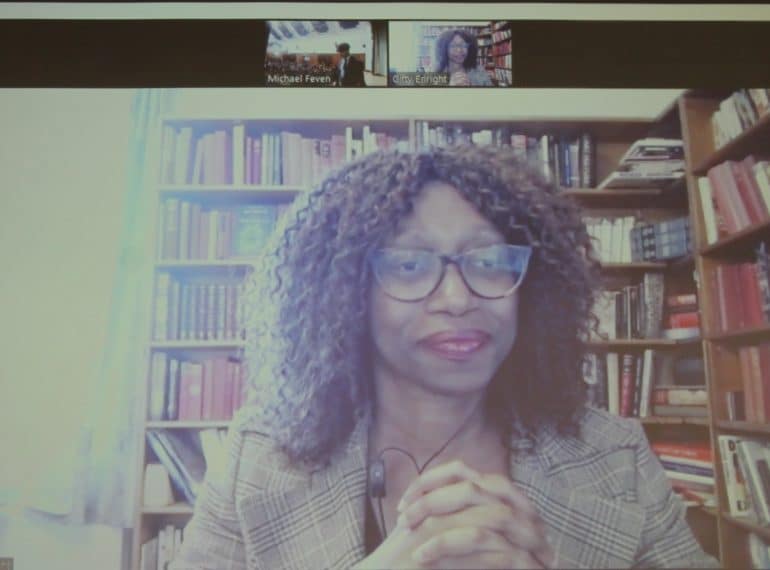
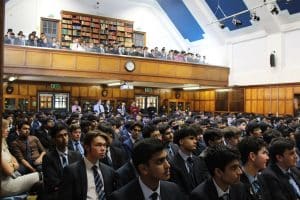 Her virtual talk was one of a number of activities held at the School during the week of International Women’s Day (IWD), which this year had the theme of #BreakTheBias.
Her virtual talk was one of a number of activities held at the School during the week of International Women’s Day (IWD), which this year had the theme of #BreakTheBias.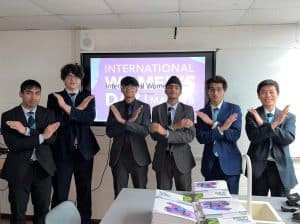 “Her talk and the other activities during the week complement the work we have been doing to encourage boys to adopt the stance of ‘
“Her talk and the other activities during the week complement the work we have been doing to encourage boys to adopt the stance of ‘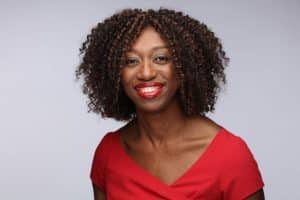 Under the topic of ‘attribution’, for example, she gave this scenario: “A female colleague says something in a meeting and is ignored but a male colleague says the same thing and everyone jumps on the idea.” The challenge she passed on was this: “Remind everyone that the idea originated from the female colleague.”
Under the topic of ‘attribution’, for example, she gave this scenario: “A female colleague says something in a meeting and is ignored but a male colleague says the same thing and everyone jumps on the idea.” The challenge she passed on was this: “Remind everyone that the idea originated from the female colleague.”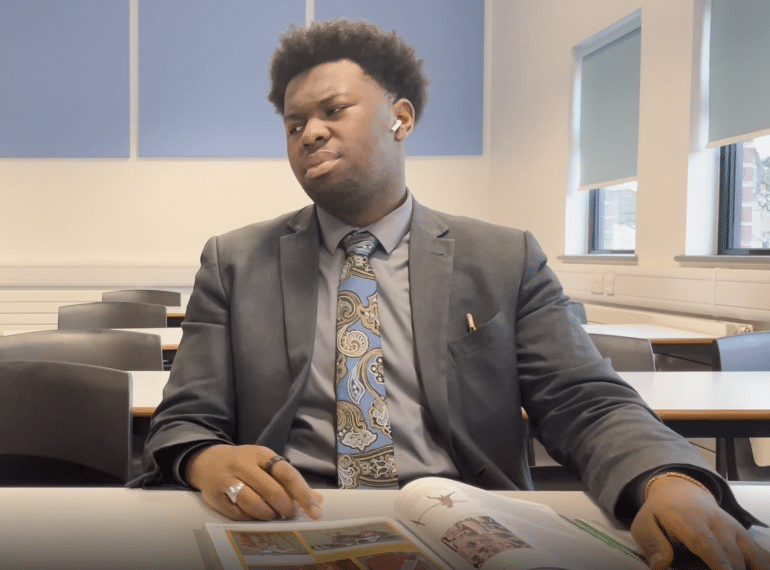
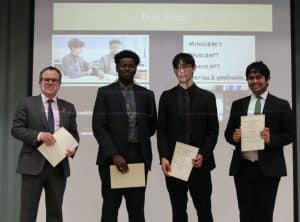 In a first for the School, QE’s team of peer mentors this year produced a series of short videos to share their wisdom and experience with younger pupils, providing useful tips and advice on topics ranging from coping with stress to how to use a homework diary.
In a first for the School, QE’s team of peer mentors this year produced a series of short videos to share their wisdom and experience with younger pupils, providing useful tips and advice on topics ranging from coping with stress to how to use a homework diary.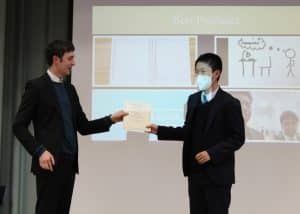 The peer videos project was organised by Head of Extra-curricular Enrichment Rebecca Grundy and Head of Year 10 Micah King, with the explicit purpose of widening the number of pupils who could benefit from the guidance of peer mentors. The peer mentors began working on their films in November, each selecting a topic that had been identified as a need for pupils within the School, and then teamed up to script, film and edit their videos.
The peer videos project was organised by Head of Extra-curricular Enrichment Rebecca Grundy and Head of Year 10 Micah King, with the explicit purpose of widening the number of pupils who could benefit from the guidance of peer mentors. The peer mentors began working on their films in November, each selecting a topic that had been identified as a need for pupils within the School, and then teamed up to script, film and edit their videos.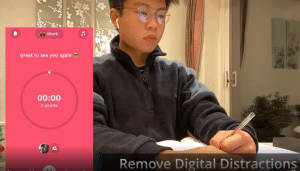 Adam Khaliq and Rudra Thakkar, both of Year 12, won the award for best cinematography with their film, Making friends at QE. “This award was given in recognition of the joy that was captured on film,” the judges wrote. “This advice guide would cheer and support students who are struggling, and the filming was creative and adventurous.”
Adam Khaliq and Rudra Thakkar, both of Year 12, won the award for best cinematography with their film, Making friends at QE. “This award was given in recognition of the joy that was captured on film,” the judges wrote. “This advice guide would cheer and support students who are struggling, and the filming was creative and adventurous.”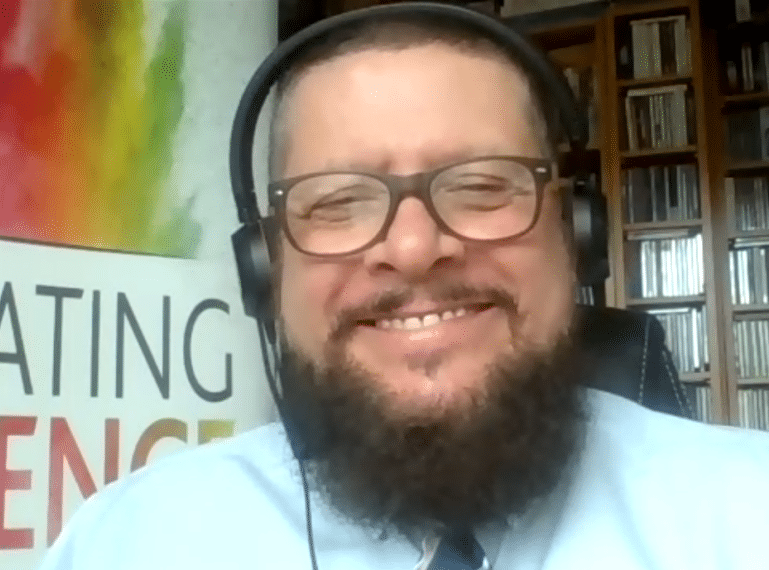
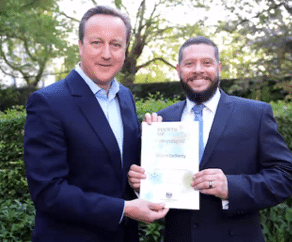 Shaun Dellenty, who has been honoured at the National Diversity Awards and was praised by then Prime Minister David Cameron for his work, led a virtual assembly for the Sixth Form, urging the boys to use their voices to advocate for what they believe in.
Shaun Dellenty, who has been honoured at the National Diversity Awards and was praised by then Prime Minister David Cameron for his work, led a virtual assembly for the Sixth Form, urging the boys to use their voices to advocate for what they believe in.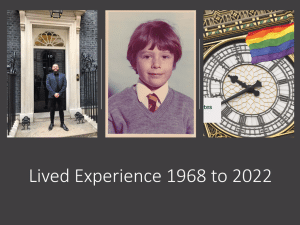 By becoming an ‘upstander’ – one who intervenes on behalf of those who are being attacked or bullied – he had had influence beyond his expectations, with a life journey that had taken him all the way to Downing Street. He told the boys he hoped the boys would reflect on how they could similarly use their voice to advocate for what they believe in.
By becoming an ‘upstander’ – one who intervenes on behalf of those who are being attacked or bullied – he had had influence beyond his expectations, with a life journey that had taken him all the way to Downing Street. He told the boys he hoped the boys would reflect on how they could similarly use their voice to advocate for what they believe in.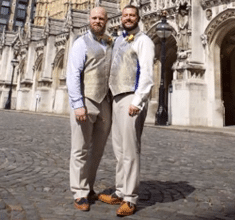 Head of Year 13 Simon Walker thanked Mr Dellenty for his talk. He noted as a History teacher that it was striking that LGBT histories were only now just starting to be unearthed or be focused on: they had previously simply not been regarded as a priority.
Head of Year 13 Simon Walker thanked Mr Dellenty for his talk. He noted as a History teacher that it was striking that LGBT histories were only now just starting to be unearthed or be focused on: they had previously simply not been regarded as a priority.